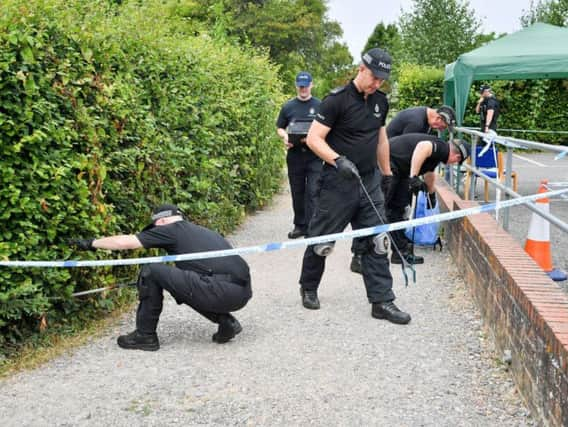Rogue states and terrorists could use technological advances to develop, store and use new chemical weapons, scientists warn


Revolutionary work in fields such as neuroscience and nanotechnology could be harnessed for malign use, according to authors of a book published today by the Royal Society of Chemistry and edited by experts in the field from the University of Bradford.
One of the book’s editors, Professor Malcolm Dando, of the University of Bradford, said: “One area of growing concern has been state interest in the aerosolised application of a range of toxic chemical agents potentially including pharmaceutical chemicals, bioregulators, and toxins that attack the central nervous system of those targeted.
Advertisement
Hide AdAdvertisement
Hide Ad“Ostensibly promoted for use in extreme law enforcement scenarios, such as large scale hostage situations, to incapacitate an individual or a group rapidly and completely without causing permanent disability or fatality, their use in practice poses grave dangers to health and well-being of all those affected.
“Furthermore, research and development in this area potentially opens up the door to new forms of chemical weapon and warfare.”
Fellow co-editor Dr Michael Crowley, also of the University of Bradford, said: “The unstable international security environment and the changing nature of armed conflict could fuel a desire by certain states to retain and use existing chemical weapons, as well as increase state interest in creating new weapons.
“At the same time, state forces, armed opposition groups, terrorist and criminal organisations may seek to employ diverse toxic chemicals as improvised weapons.
Advertisement
Hide AdAdvertisement
Hide Ad“Stark indications of the multi-faceted dangers we face can be seen in the chemical weapons attacks against civilians and combatants in Iraq and Syria, and also in more targeted chemical assassination operations in Malaysia and the UK.
“The threats posed by chemical weapons have not gone away – they are a continuing menace to human rights, peace and international security today.”
The international Chemical Weapons Convention, and its associated implementing body, the Organisation for the Prohibition of Chemical Weapons (OPCW), has to date seen about 96 per cent of the world’s declared stockpiles of chemical agents eliminated.
However, the Russian state, a signatory to the treaty, is accused of involvement in the poisonings of four people in Salisbury using the nerve agent Novichok, while the UN has accused the Syrian government, another signatory, of using the nerve agent sarin in attacks in the country.
Advertisement
Hide AdAdvertisement
Hide AdUS and South Korean officials have accused North Korea, which has not signed up to the convention, of involvement in the killing of leader Kim Jong-un's half-brother Kin Jong-nam in a Malaysian airport using the nerve agent VX last year.
The authors of Preventing Chemical Weapons: Arms Control and Disarmament as the Sciences Converge have called on the international community to prepare the Convention for new threats at a review conference being held at The Hague, in the Netherlands, from November 21 to 30.
Dr Ralf Trapp, a former senior OPCW official and now a leading international arms control consultant, said: “The upcoming Review Conference is an opportunity for the OPCW to agree on strategies and practical measures to respond to these challenges and strengthen the global norm against chemical weapons, and the institutions that have been created to enforce it.
“To do so, the OPCW must regain the political cohesion and unity of purpose that it showed when it had to resolve critical problems in the past, such as the failure by key countries to meet the final deadline of the Convention for the destruction of all chemical weapons in 2012, or the agreement to eliminate the Syrian chemical weapons programme in 2013.
"The Review Conference is a chance to overcome the divisions that have emerged in recent years in the OPCW – a chance that must not be missed.”